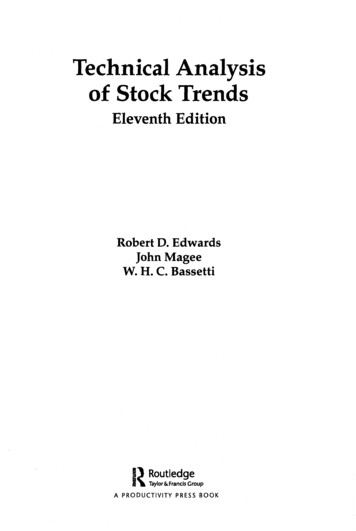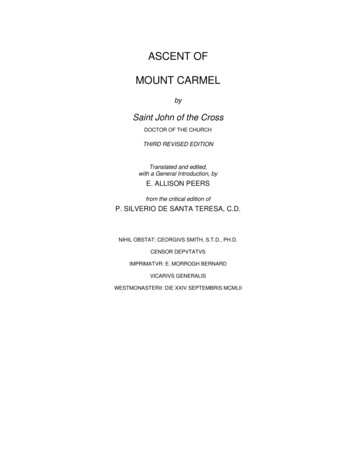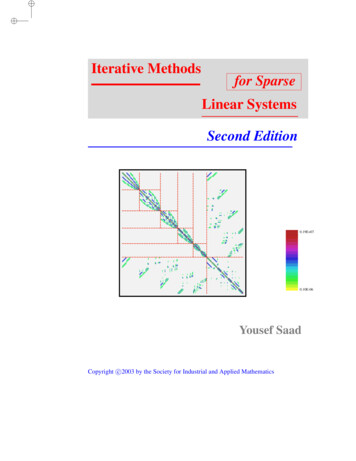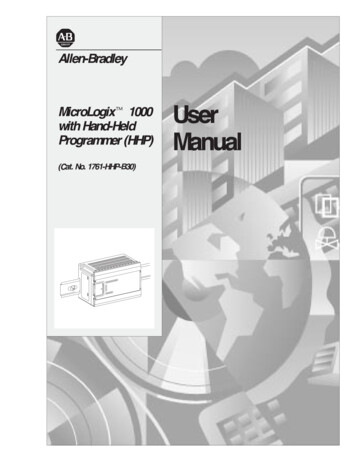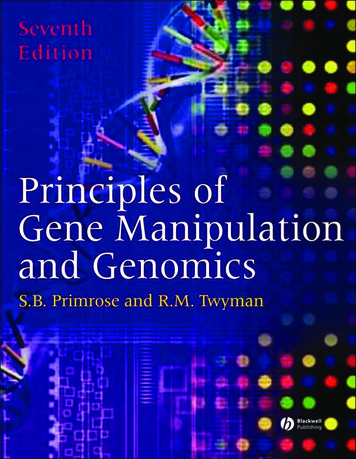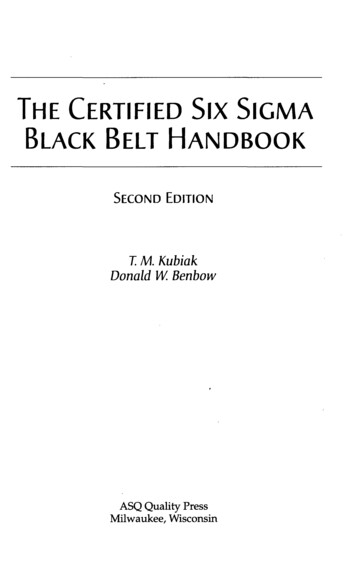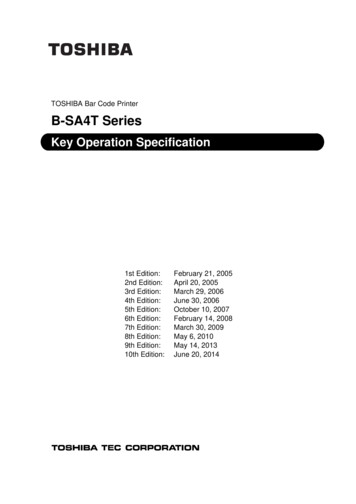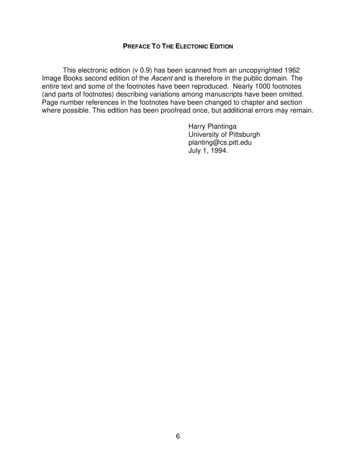
Transcription
PREFACE TO THE ELECTONIC EDITIONThis electronic edition (v 0.9) has been scanned from an uncopyrighted 1962Image Books second edition of the Ascent and is therefore in the public domain. Theentire text and some of the footnotes have been reproduced. Nearly 1000 footnotes(and parts of footnotes) describing variations among manuscripts have been omitted.Page number references in the footnotes have been changed to chapter and sectionwhere possible. This edition has been proofread once, but additional errors may remain.Harry PlantingaUniversity of Pittsburghplanting@cs.pitt.eduJuly 1, 1994.6
ASCENT OF MOUNT CARMELTreats of how the soul may prepare itself in order to attain in a short time to Divineunion. Gives very profitable counsels and instruction, both to beginners and toproficients, that they may know how to disencumber themselves of all that is temporaland not to encumber themselves with the spiritual, and to remain in completedetachment and liberty of spirit, as is necessary for Divine union.ARGUMENTALL the doctrine whereof I intend to treat in this Ascent of Mount Carmel is included inthe following stanzas, and in them is also described the manner of ascending to thesummit of the Mount, which is the high estate of perfection which we here call union ofthe soul with God. And because I must continually base upon them that which I shallsay, I have desired to set them down here together, to the end that all the substance ofthat which is to be written may be seen and comprehended together; although it will befitting to set down each stanza separately before expounding it, and likewise the lines ofeach stanza, according as the matter and the exposition require. The poem, then, runsas follows:6565[Lit.: 'It says, then, thus.']54
STANZAS66Wherein the soul sings of the happy chance which it had in passing through thedark night of faith, in detachment and purgation of itself, to union with the Beloved.1.On a dark night, Kindled67 in love with yearnings -- oh, happychance! -I went forth without being observed, My house being now atrest.682.In darkness and secure, By the secret ladder, disguised -- oh,happy chance! -In darkness and in concealment, My house being now at rest.3.In the happy night, In secret, when none saw me,Nor I beheld aught, Without light or guide, save that which burnedin my heart.4.This light guided me More surely than the light of noonday,To the place where he (well I knew who!) was awaiting me -- Aplace where none appeared.5.Oh, night that guided me, Oh, night more lovely than the dawn,Oh, night that joined Beloved with lover, Lover transformed in theBeloved!6.Upon my flowery breast, Kept wholly for himself alone,There he stayed sleeping, and I caressed him, And the fanning ofthe cedars made a breeze.7.The breeze blew from the turret As I parted his locks;With his gentle hand he wounded my neck And caused all mysenses to be suspended.8.I remained, lost in oblivion;69 My face I reclined on the Beloved.All ceased and I abandoned myself, Leaving my cares forgottenamong the lilies.66For a verse translation in the metre of the original, see Vol. II.67[The adjectives are feminine throughout.]68[The word translated 'at rest' is a past participle: more literally, ‘stilled.']69[Lit.: 'I remained and forgot.']55
PROLOGUEIN order to expound and describe this dark night, through which the soul passes inorder to attain to the Divine light of the perfect union of the love of God, as far as ispossible in this life, it would be necessary to have illumination of knowledge andexperience other and far greater than mine; for this darkness and these trials, bothspiritual and temporal, through which happy souls are wont to pass in order to be ableto attain to this high estate of perfection, are so numerous and so profound that neitherdoes human knowledge suffice for the understanding of them, nor experience for thedescription of them; for only he that passes this way can understand it, and even hecannot describe it.2. Therefore, in order to say a little about this dark night, I shall trust neither toexperience nor to knowledge, since both may fail and deceive; but, while not omitting tomake such use as I can of these two things, I shall avail myself, in all that, with theDivine favour, I have to say, or at the least, in that which is most important and dark tothe understanding, of Divine Scripture; for, if we guide ourselves by this, we shall beunable to stray, since He Who speaks therein is the Holy Spirit. And if aught I stray,whether through my imperfect understanding of that which is said in it or of mattersuncollected with it, it is not my intention to depart from the sound sense and doctrine ofour Holy Mother the Catholic Church; for in such a case I submit and resign myselfwholly, not only to her command, but to whatever better judgment she may pronounceconcerning it.3. To this end I have been moved, not by any possibility that I see in myself ofaccomplishing so arduous a task, but by the confidence which I have in the Lord that Hewill help me to say something to relieve the great necessity which is experienced bymany souls, who, when they set out upon the road of virtue, and Our Lord desires tobring them into this dark night that they may pass through it to Divine union, make noprogress. At times this is because they have no desire to enter it or to allow themselvesto be led into it; at other times, because they understand not themselves and lackcompetent and alert directors70 who will guide them to the summit. And so it is sad tosee many souls to whom God gives both aptitude and favour with which to makeprogress (and who, if they would take courage, could attain to this high estate),remaining in an elementary stage71 of communion with God, for want of will, orknowledge, or because there is none who will lead them in the right path or teach themhow to get away from these beginnings. And at length, although Our Lord grants themsuch favour as to make them to go onward without this hindrance or that, they arrive attheir goal very much later, and with greater labour, yet with less merit, because theyhave not conformed themselves to God, and allowed themselves to be brought freelyinto the pure and sure road of union. For, although it is true that God is leading them,and that He can lead them without their own help, they will not allow themselves to beled; and thus they make less progress, because they resist Him Who is leading them,and they have less merit, because they apply not their will, and on this account theysuffer more. For these are souls who, instead of committing themselves to God andmaking use of His help, rather hinder God by the indiscretion of their actions or by their70[Lit. 'and wideawake guides.']71[Lit., 'a low manner.']56
resistance; like children who, when their mothers desire to carry them in their arms, startstamping and crying, and insist upon being allowed to walk, with the result that they canmake no progress; and, if they advance at all, it is only at the pace of a child.4. Wherefore, to the end that all, whether beginners or proficients, may know howto commit themselves to God's guidance, when His Majesty desires to lead themonward, we shall give instruction and counsel, by His help, so that they may be able tounderstand His will, or, at the least, allow Him to lead them. For some confessors andspiritual fathers, having no light and experience concerning these roads, are wont tohinder and harm such souls rather than to help them on the road; they are like thebuilders of Babel, who, when told to furnish suitable material, gave and applied othervery different material, because they understood not the language, and thus nothingwas done. Wherefore, it is a difficult and troublesome thing at such seasons for a soulnot to understand itself or to find none who understands it. For it will come to pass thatGod will lead the soul by a most lofty path of dark contemplation and aridity, wherein itseems to be lost, and, being thus full of darkness and trials, constraints andtemptations, will meet one who will speak to it like Job's comforters, and say that it issuffering from melancholy, or low spirits, or a morbid disposition, or that it may havesome hidden sin, and that it is for this reason that God has forsaken it. Such comfortersare wont to declare immediately that that soul must have been very evil, since suchthings as these are befalling it.5. And there will likewise be those who tell the soul to retrace its steps, since it isfinding no pleasure or consolation in the things of God as it did aforetime. And in thisway they double the poor soul's trials; for it may well be that the greatest affliction whichit is feeling is that of the knowledge of its own miseries, thinking that it sees itself, moreclearly than daylight, to be full of evils and sins, for God gives it that light of knowledgein that night of contemplation, as we shall presently show. And, when the soul findssomeone whose opinion agrees with its own, and who says that these things must bedue to its own fault, its affliction and trouble increase infinitely and are wont to becomemore grievous than death. And, not content with this, such confessors, thinking thatthese things proceed from sin, make these souls go over their lives and cause them tomake many general confessions, and crucify them afresh; not understanding that thismay quite well not be the time for any of such things, and that their penitents should beleft in the state of purgation which God gives them, and be comforted and encouragedto desire it until God be pleased to dispose otherwise; for until that time, no matter whatthe souls themselves may do and their confessors may say, there is no remedy forthem.6. This, with the Divine favour, we shall consider hereafter, and also how the soulshould conduct itself at such a time, and how the confessor must treat it, and what signsthere will be whereby it may be known if this is the purgation of the soul; and, in suchcase, whether it be of sense or of spirit (which is the dark night whereof we speak), andhow it may be known if it be melancholy or some other imperfection with respect tosense or to spirit. For there may be some souls who will think, or whose confessors willthink, that God is leading them along this road of the dark night of spiritual purgation,whereas they may possibly be suffering only from some of the imperfectionsaforementioned. And, again, there are many souls who think that they have no aptitudefor prayer, when they have very much; and there are others who think that they havemuch when they have hardly any.7. There are other souls who labour and weary themselves to a piteous extent,57
and yet go backward, seeking profit in that which is not profitable, but is rather ahindrance; and there are still others who, by remaining at rest and in quietness,continue to make great progress. There are others who are hindered and disturbed andmake no progress, because of the very consolations and favours that God is grantingthem in order that they may make progress. And there are many other things on thisroad that befall those who follow it, both joys and afflictions and hopes and griefs: someproceeding from the spirit of perfection and others from imperfection. Of all these, withthe Divine favour, we shall endeavour to say something, so that each soul who readsthis may be able to see something of the road that he ought to follow, if he aspire toattain to the summit of this Mount.8. And, since this introduction relates to the dark night through which the soulmust go to God, let not the reader marvel if it seem to him somewhat dark also. This, Ibelieve, will be so at the beginning when he begins to read; but, as he passes on, hewill find himself understanding the first part better, since one part will explain another.And then, if he read it a second time, I believe it will seem clearer to him and theinstruction will appear sounder. And if any persons find themselves disagreeing with thisinstruction, it will be due to my ignorance and poor style; for in itself the matter is goodand of the first importance. But I think that, even were it written in a more excellent andperfect manner than it is, only the minority would profit by it, for we shall not here setdown things that are very moral and delectable72 for all spiritual persons who desire totravel toward God by pleasant and delectable ways, but solid and substantialinstruction, as well suited to one kind of person as to another, if they desire to pass tothe detachment of spirit which is here treated.9. Nor is my principal intent to address all, but rather certain persons of oursacred Order of Mount Carmel of the primitive observance, both friars and nuns -- sincethey have desired me to do so -- to whom God is granting the favour of setting them onthe road to this Mount; who, as they are already detached from the temporal things ofthis world, will better understand the instruction concerning detachment of spirit.72Needless to say, the Saint does not here mean that he will not write in conformity with moral standards-- no writer is more particular in this respect -- nor that he will deal with no delectable matters at all, butrather that he will go to the very roots of spiritual teaching and expound the 'solid and substantialinstruction,' which not only forms its basis but also leads the soul toward the most intimate union with Godin love.58
BOOK THE FIRSTWherein is described the nature of dark night and how necessary it is to pass through itto Divine union; and in particular this book describes the dark night of sense, anddesire, and the evils which these work in the soul.73CHAPTER ISets down the first stanza. Describes two different nights through which spiritualpersons pass, according to the two parts of man, the lower and the higher. Expoundsthe stanza which follows.STANZA THE FIRSTOn a dark night, Kindled in love with yearnings -- oh, happy chance! -I went forth without being observed, My house being now at rest.IN this first stanzas the soul sings of the happy fortune and chance which it experiencedin going forth from all things that are without, and from the desires74 and imperfectionsthat are in the sensual75 part of man because of the disordered state of his reason. Forthe understanding of this it must be known that, for a soul to attain to the state ofperfection, it has ordinarily first to pass through two principal kinds of night, whichspiritual persons call purgations or purifications of the soul; and here we call themnights, for in both of them the soul journeys, as it were, by night, in darkness.2. The first night or purgation is of the sensual part of the soul, which is treated inthe present stanza, and will be treated in the first part of this book. And the second is ofthe spiritual part; of this speaks the second stanza, which follows; and of this we shalltreat likewise, in the second and the third part,76 with respect to the activity of the soul;and in the fourth part, with respect to its passitivity.3. And this first night pertains to beginners, occurring at the time when Godbegins to bring them into the state of contemplation; in this night the spirit likewise has apart, as we shall say in due course. And the second night, or purification, pertains to73The Codices give neither title nor sub-title: both were inserted in e.p. ['Desire' is to be taken as thedirect object of 'describes'; 'these' refers to 'sense' and 'desire,' not to the dark night.]74[Lit., 'appetites,' but this word is uniformly translated 'desires,' as the Spanish context frequently will notadmit the use of the stronger word in English.]75[The word translated 'sensual' is sometimes sensual, and sometimes, as here, sensitivo. The meaningin either case is simply 'of sense.']76So Alc. The other authorities read: 'and of this we shall treat likewise, in the second part with respect tothe activity [of the soul] [these last three words are not contained in the Spanish of any authority], and inthe third and the fourth part with respect to its passivity.' E.p. follows this division. Alc., however, seems tocorrespond more closely with the Saint's intentions; for he did not divide each of his 'books' into 'parts'and appears therefore to indicate by 'part' what we know as 'book.' Now Book I is in fact devoted to theactive purgation of sense, as are Books II and III to the active purgation of the spirit. For the 'fourth book,'see General Introduction, IV above.59
those who are already proficient, occurring at the time when God desires to bring themto the state of union with God. And this latter night is a more obscure and dark andterrible purgation, as we shall say afterwards.4. Briefly, then, the soul means by this stanza that it went forth (being led byGod) for love of Him alone, enkindled in love of Him, upon a dark night, which is theprivation and purgation of all its sensual desires, with respect to all outward things of theworld and to those which were delectable to its flesh, and likewise with respect to thedesires of its will. This all comes to pass in this purgation of sense; for which cause thesoul says that it went forth while its house was still at rest;77 which house is its sensualpart, the desires being at rest and asleep in it, as it is to them.78 For there is no goingforth from the pains and afflictions of the secret places of the desires until these bemortified and put to sleep. And this, the soul says, was a happy chance for it -- namely,its going forth without being observed: that is, without any desire of its flesh or any otherthing being able to hinder it. And likewise, because it went out by night -- which signifiesthe privation of all these things wrought in it by God, which privation was night for it.5. And it was a happy chance that God should lead it into this night, from whichthere came to it so much good; for of itself the soul would not have succeeded inentering therein, because no man of himself can succeed in voiding himself of all hisdesires in order to come to God.6. This is, in brief, the exposition of the stanza; and we shall now have to gothrough it, line by line, setting down one line after another, and expounding that whichpertains to our purpose. And the same method is followed in the other stanzas, as I saidin the Prologue79 -- namely, that each stanza will be set down and expounded, andafterwards each line.CHAPTER IIExplains the nature of this dark night through which the soul says that it has passed onthe road to union.On A Dark NightWE may say that there are three reasons for which this journey80 made by the soul tounion with God is called night. The first has to do with the point from which the soulgoes forth, for it has gradually to deprive itself of desire for all the worldly things which itpossessed, by denying them to itself;81 the which denial and deprivation are, as it were,night to all the senses of man. The second reason has to do with the mean,82 or theroad along which the soul must travel to this union -- that is, faith, which is likewise asdark as night to the understanding. The third has to do with the point to which it travels - namely, God, Who, equally, is dark night to the soul in this life. These three nights77[The word translated 'at rest' is a past participle: more literally, ‘stilled.']78[Lit., 'and it in them.' This 'it' means the soul; the preceding 'it,' the house.]79I.e., in the 'Argument.'80[More exactly, this 'passage' or 'transition' (tr‡nsito).]81[Lit., 'in negation of them.']82[By 'the mean' is meant the middle, or main part, of the journey.]60
must pass through the soul -- or, rather, the soul must pass through them -- in order thatit may come to Divine union with God.2. In the book of the holy Tobias these three kinds of night were shadowed forthby the three nights which, as the angel commanded, were to pass ere the youth Tobiasshould be united with his bride. In the first he commanded him to burn the heart of thefish in the fire, which signifies the heart that is affectioned to, and set upon, the things ofthe world; which, in order that one may begin to journey toward God, must be burnedand purified from all that is creature, in the fire of the love of God. And in this purgationthe devil flees away, for he has power over the soul only when it is attached to thingscorporeal and temporal.3. On the second night the angel told him that he would be admitted into thecompany of the holy patriarchs, who are the fathers of the faith. For, passing throughthe first night, which is self-privation of all objects of sense, the soul at once enters intothe second night, and abides alone in faith to the exclusion, not of charity, but of otherknowledge acquired by the understanding, as we shall say hereafter, which is a thingthat pertains not to sense.4. On the third night the angel told him that he would obtain a blessing, which isGod; Who, by means of the second night, which is faith, continually communicatesHimself to the soul in such a secret and intimate manner that He becomes another nightto the soul, inasmuch as this said communication is far darker than those others, as weshall say presently. And, when this third night is past, which is the completeaccomplishment of the communication of God in the spirit, which is ordinarily wrought ingreat darkness of the soul, there then follows its union with the Bride, which is theWisdom of God. Even so the angel said likewise to Tobias that, when the third nightwas past, he should be united with his bride in the fear of the Lord; for, when this fear ofGod is perfect, love is perfect, and this comes to pass when the transformation of thesoul is wrought through its love.5. These three parts of the night are all one night; but, after the manner of night,it has three parts. For the first part, which is that of sense, is comparable to thebeginning of night, the point at which things begin to fade from sight. And the secondpart, which is faith, is comparable to midnight, which is total darkness. And the third partis like the close of night, which is God, the which part is now near to the light of day.And, that we may understand this the better, we shall treat of each of these reasonsseparately as we proceed.CHAPTER IIISpeaks of the first cause of this night, which is that of the privation of the desire in allthings, and gives the reason for which it is called night.WE here describe as night the privation of every kind of pleasure which belongs to thedesire; for, even as night is naught but the privation of light, and, consequently, of allobjects that can be seen by means of light, whereby the visual faculty remainsunoccupied83 and in darkness, even so likewise the mortification of desire may becalled night to the soul. For, when the soul is deprived of the pleasure of its desire in all83[Lit., 'without anything (sc. to do).']61
things, it remains, as it were, unoccupied and in darkness. For even as the visualfaculty, by means of light, is nourished and fed by objects which can be seen, andwhich, when the light is quenched, are not seen, even so, by means of the desire, thesoul is nourished and fed by all things wherein it can take pleasure according to itsfaculties; and, when this also is quenched, or rather, mortified, the soul ceases to feedupon the pleasure of all things, and thus, with respect to its desire, it remainsunoccupied and in darkness.2. Let us take an example from each of the faculties. When the soul deprives itsdesire of the pleasure of all that can delight the sense of hearing, the soul remainsunoccupied and in darkness with respect to this faculty. And, when it deprives itself ofthe pleasure of all that can please the sense of sight, it remains unoccupied and indarkness with respect to this faculty also. And, when it deprives itself of the pleasure ofall the sweetness of perfumes which can give it pleasure through the sense of smell, itremains equally unoccupied and in darkness according to this faculty. And, if it alsodenies itself the pleasure of all food that can satisfy the palate, the soul likewise remainsunoccupied and in darkness. And finally, when the soul mortifies itself with respect to allthe delights and pleasures that it can receive from the sense of touch, it remains, in thesame way, unoccupied and in darkness with respect to this faculty. So that the soul thathas denied and thrust away from itself the pleasures which come from all these things,and has mortified its desire with respect to them, may be said to be, as it were, in thedarkness of night, which is naught else than an emptiness within itself of all things.3. The reason for this is that, as the philosophers say, the soul, as soon as Godinfuses it into the body, is like a smooth, blank board84 upon which nothing is painted;and, save for that which it experiences through the senses, nothing is communicated toit, in the course of nature, from any other source. And thus, for as long as it is in thebody, it is like one who is in a dark prison and who knows nothing, save what he is ableto see through the windows of the said prison; and, if he saw nothing through them, hewould see nothing in any other way. And thus the soul, save for that which iscommunicated to it through the senses, which are the windows of its prison, couldacquire nothing, in the course of nature, in any other way.4. Wherefore, if the soul rejects and denies that which it can receive through thesenses, we can quite well say that it remains, as it were, in darkness and empty; since,as appears from what has been said, no light can enter it, in the course of nature, byany other means of illumination than those aforementioned. For, although it is true thatthe soul cannot help hearing and seeing and smelling and tasting and touching, this isof no greater import, nor, if the soul denies and rejects the object, is it hindered morethan if it saw it not, heard it not, etc. Just so a man who desires to shut his eyes willremain in darkness, like the blind man who has not the faculty of sight. And to thispurpose David says these words: Pauper sum ego, et in laboribus a indenture mea.85Which signifies: I am poor and in labours from my youth. He calls himself poor, althoughit is clear that he was rich, because his will was not set upon riches, and thus it was asthough he were really poor. But if he had not been really poor and had not been so inhis will, he would not have been truly poor, for his soul, as far as its desire wasconcerned, would have been rich and replete. For that reason we call this detachmentnight to the soul, for we are not treating here of the lack of things, since this implies no84['Blank board': Sp., tabla rasa; Lat., tabula rasa.]85Psalm lxxxvii, 16 [A.V. lxxxviii, 15].62
detachment on the part of the soul if it has a desire for them; but we are treating of thedetachment from them of the taste and desire, for it is this that leaves the soul free andvoid of them, although it may have them; for it is not the things of this world that eitheroccupy the soul or cause it harm, since they enter it not, but rather the will and desirefor them, for it is these that dwell within it.5. This first kind of night, as we shall say hereafter, belongs to the soul accordingto its sensual part, which is one of the two parts, whereof we spoke above, throughwhich the soul must pass in order to attain to union.6. Let us now say how meet it is for the soul to go forth from its house into thisdark night of sense, in order to travel to union with God.CHAPTER IVWherein is declared how necessary it is for the soul truly to pass through this dark nightof sense, which is mortification of desire, in order that it may journey to union with God.THE reason for which it is necessary for the soul, in order to attain to Divine union withGod, to pass through this dark night of mortification of the desires and denial ofpleasures in all things, is because all the affections which it has for creatures are puredarkness in the eyes of God, and, when the soul is clothed in these affections, it has nocapacity for being enlightened and possessed by the pure and simple light of God, if itfirst cast them not from it; for light cannot agree with darkness; since, as Saint Johnsays: Tenebroe eam non comprehenderunt.86 That is: The darkness could not receivethe light.2. The reason is that two contraries (even as philosophy teaches us) cannotcoexist in one person; and that darkness, which is affection set upon the creatures, andlight, which is God, are contrary to each other, and have no likeness or accord betweenone another, even as Saint Paul taught the Corinthians, saying: Quoe conventio luci adtenebras?87 That is to say: What communion can there be between light and darkness?Hence it is that the light of Divine union cannot dwell in the soul if these affections firstflee not away from it.3. In order that we may the better prove what has been said, it must be knownthat the affection and attachment which the soul has for creatures renders the soul liketo these creatures; and, the greater is its affection, the closer is the equality andlikeness between them; for love creates a likeness between that which loves and thatwhich is loved. For which reason David, speaking of those who set their affections uponidols, said thus: Similes illis fiant qui faciunt ea: et omnes qui confidunt in eis.88 Whichsignifies: Let them that set their heart upon them be like to them. And thus, he that lovesa creature becomes as low as that creature, and, in some ways, lower; for love not onlymakes the lover equal to the object of his love, but even subjects him to it. Hence in thesame way it comes to pass that the soul that loves anything else becomes incapable ofpure union with God and transformation in Him. For the low estate of the creature ismuch less capable of union with the high estate of the Creator than is darkness with86St. John i, 5.872 Corinthians vi, 14.88Psalm cxi
Image Books second edition of the Ascent and is therefore in the public domain. The entire text and some of the footnotes have been reproduced. Nearly 1000 footnotes . ALL the doctrine whereof I intend to treat in this Ascent of Mount Carmel is included in the following stanzas, and in them is also described the manner of ascending to the


